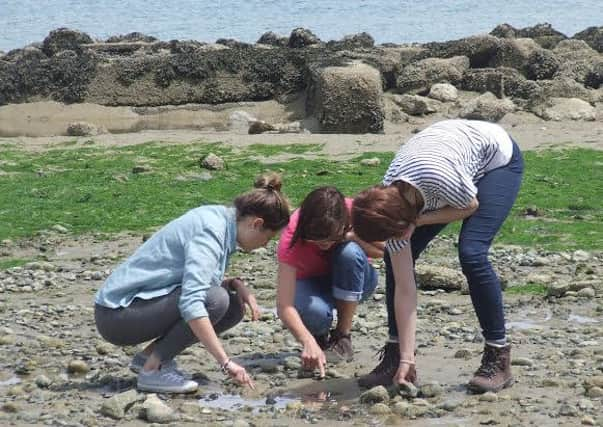Seashore learning at marine day
This article contains affiliate links. We may earn a small commission on items purchased through this article, but that does not affect our editorial judgement.


The conference was attended by teachers from 19 local schools, who participated in a number of workshop activities on the beach to widen their experience and knowledge.
The workshops also explored how the teachers can use marine studies as part of the school curriculum.
Advertisement
Hide AdAdvertisement
Hide AdSome schools are unable to visit the beach, and the conference aimed to explore how the excitement of the seashore can be brought into the classroom.
Steve Savage, the conference lead and education coordinator on the nature reserve, said: “Not only do we have this fantastic beach and rare vegetated shingle habitat, but the coastal geography of the area is special too, the dynamic processes that formed the spit and continue to shape our coastline, and all this entwined with a fascinating maritime history.”
The workshop activities focused on the vegetated shingle habitat, encouraging the teachers to search for clues as to how plants can not only survive in inhospitable environments, but actually thrive.
They also explored the beach, searching for invertebrates, birds and lizards that visit the shingle habitat.
Advertisement
Hide AdAdvertisement
Hide AdSteve said: “The vibrant carpet of colour is always a surprise to people not familiar with vegetated shingle especially when you consider the limited soil and freshwater and the challenges of drying sun and winds and the ever present salty sea spray.”
Teachers also explored the tide pools, discovering a variety of marine creatures from crabs and shrimps to cockles and sea anemones.
The team then examined and identified the objects they had collected from the shoreline, including crab shells, cuttlefish bone, ray egg cases, whelk eggs and cuttlefish eggs.
The conference demonstrated that the seashore offers a wide range of teaching opportunities, from science and geography to history, as well as art and literacy.
Advertisement
Hide AdAdvertisement
Hide Ad“We introduced teachers to some class based investigations and the use of simple USB equipment, such as our programme of demonstrating live marine creatures in school using USB microscope devices,” said Steve.
“The day concluded with a discussion about the possible impact on Shoreham Beach by climate change, sea level and sea temperature rise and other global issues.”
The conference was run in partnership with South East Grid for Learning Associates and was supported by Friends of Shoreham Beach, an organisation which works to protect and enhance the rare shingle habitat from local threats such as human activities.
Steve said: “We received some great positive feedback from the teachers, and we hope that the conference will become an annual event.”
Advertisement
Hide AdAdvertisement
Hide Ad“We are already looking to next year’s conference, and would love to hear from any schools that might be interested to attend next year.”
You can find out more about the marine programme by visiting the Friends of Shoreham Beach website www.fosbeach.com, or contact Steve on [email protected].
Don’t miss out on all the latest breaking news where you live.
Here are four ways you can be sure you’ll be amongst the first to know what’s going on.
Advertisement
Hide AdAdvertisement
Hide Ad1) Make our website your homepage at www.shorehamherald.co.uk/
2) Like our Facebook page at www.facebook.com/ShorehamHerald
3) Follow us on Twitter @Shoreham_Herald
4) Register with us by clicking on ‘sign in’ (top right corner). You can then receive our daily newsletter AND add your point of view to stories that you read here.
And do share with your family and friends - so they don’t miss out!
The Shoreham Herald - always the first with your local news.
Be part of it.